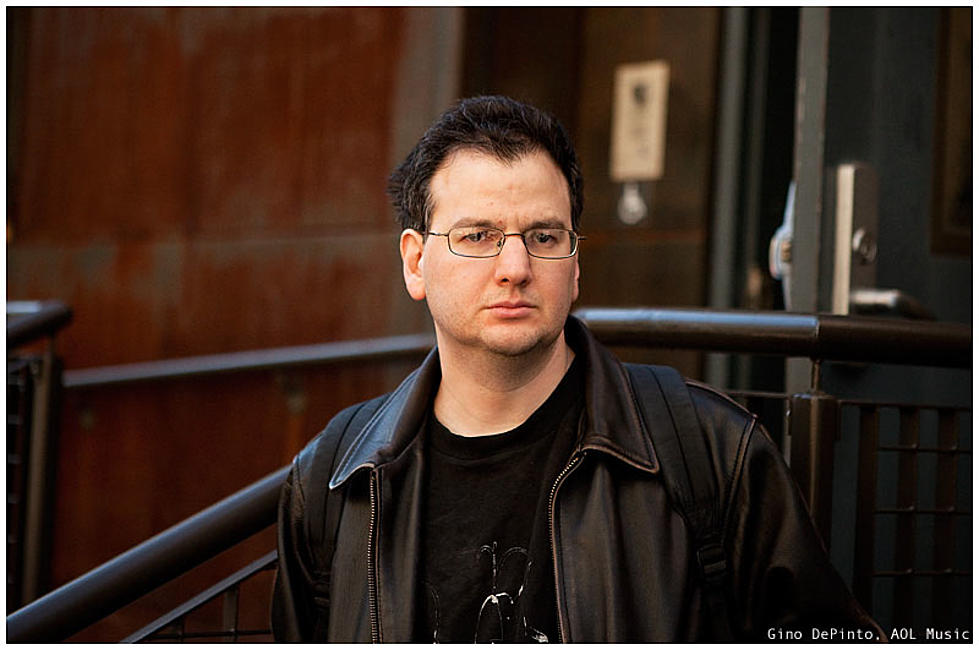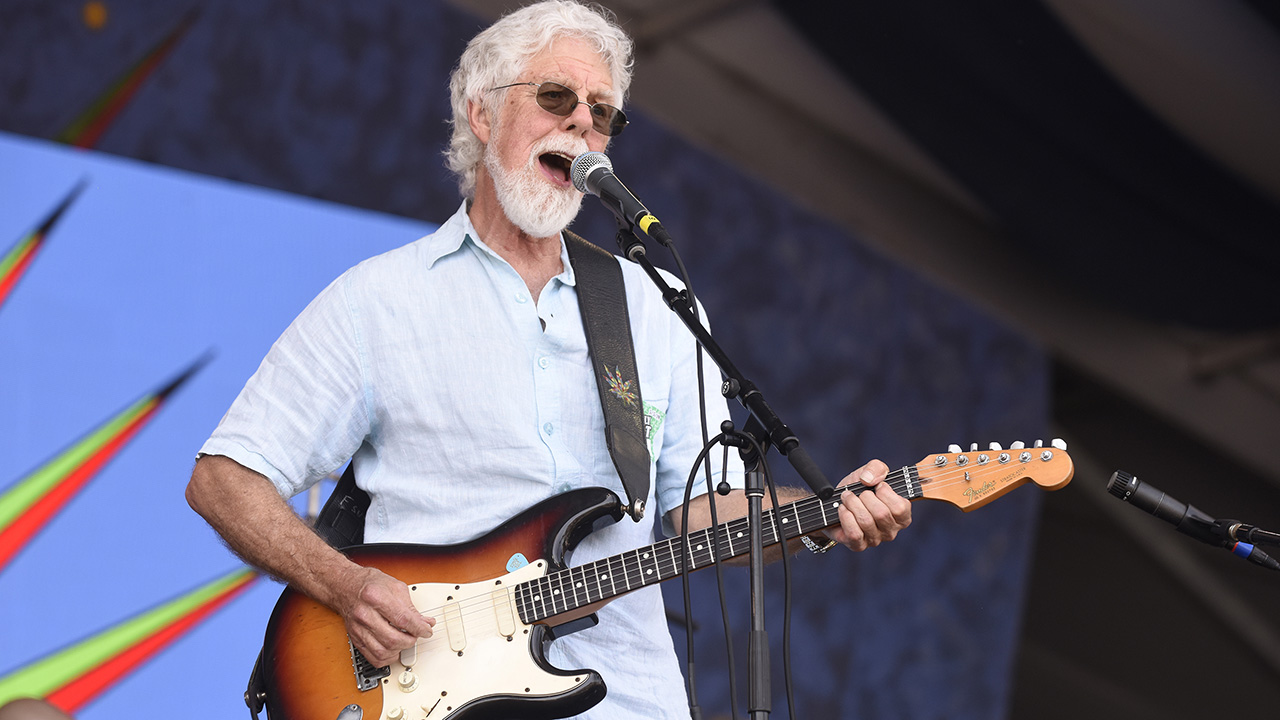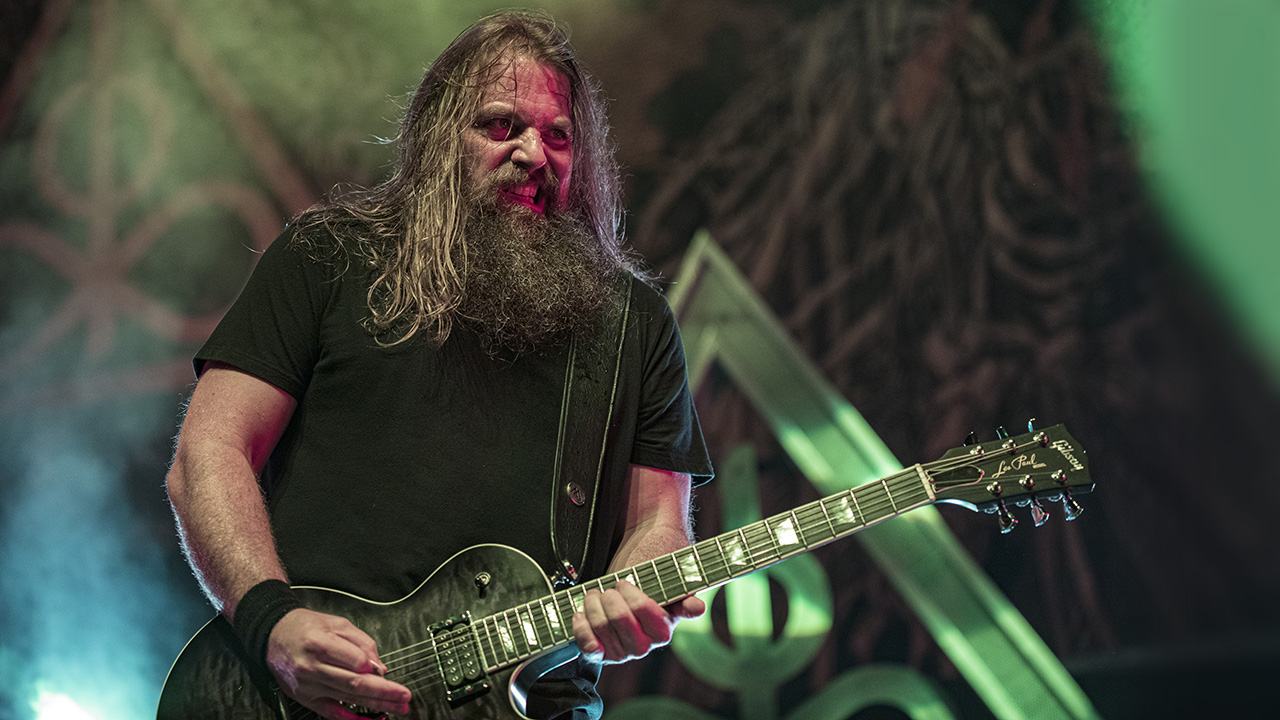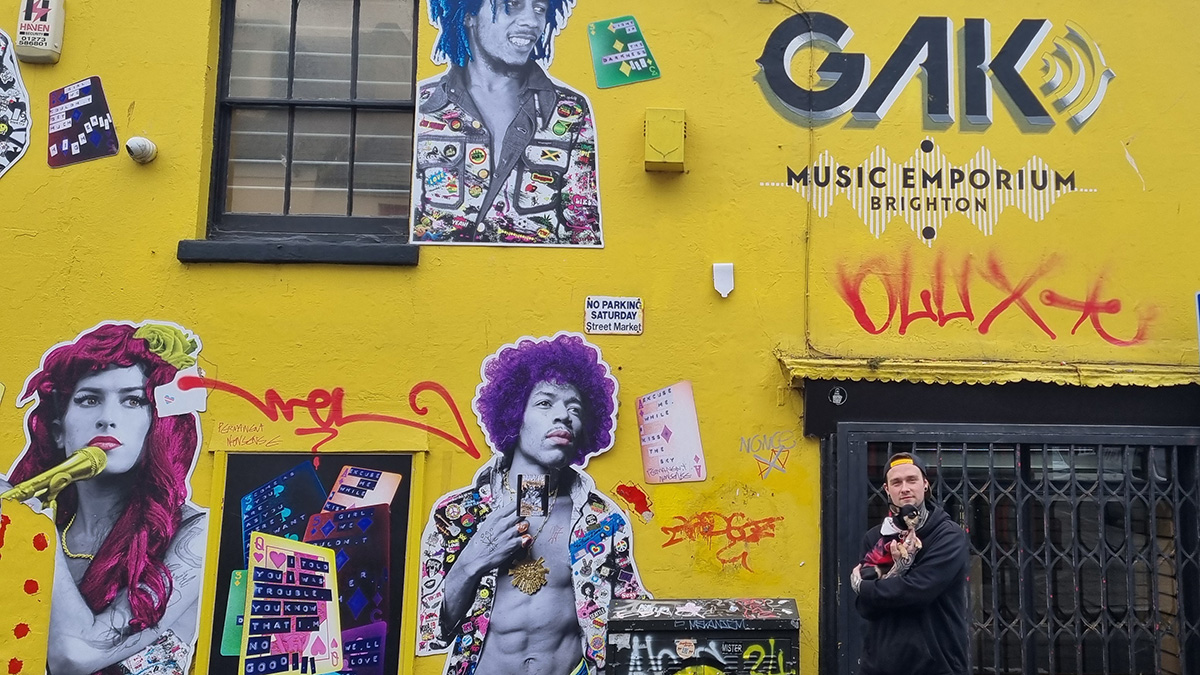Lamb of God’s Mark Morton and Willie Adler on making “combative and confrontational” new album, Omens
Recorded live in the studio, Omens finds Morton and Adler tag-teaming on irresistible grooves, grist for the mosh-pit’s mill, and one of the standout metal guitar albums of 2022
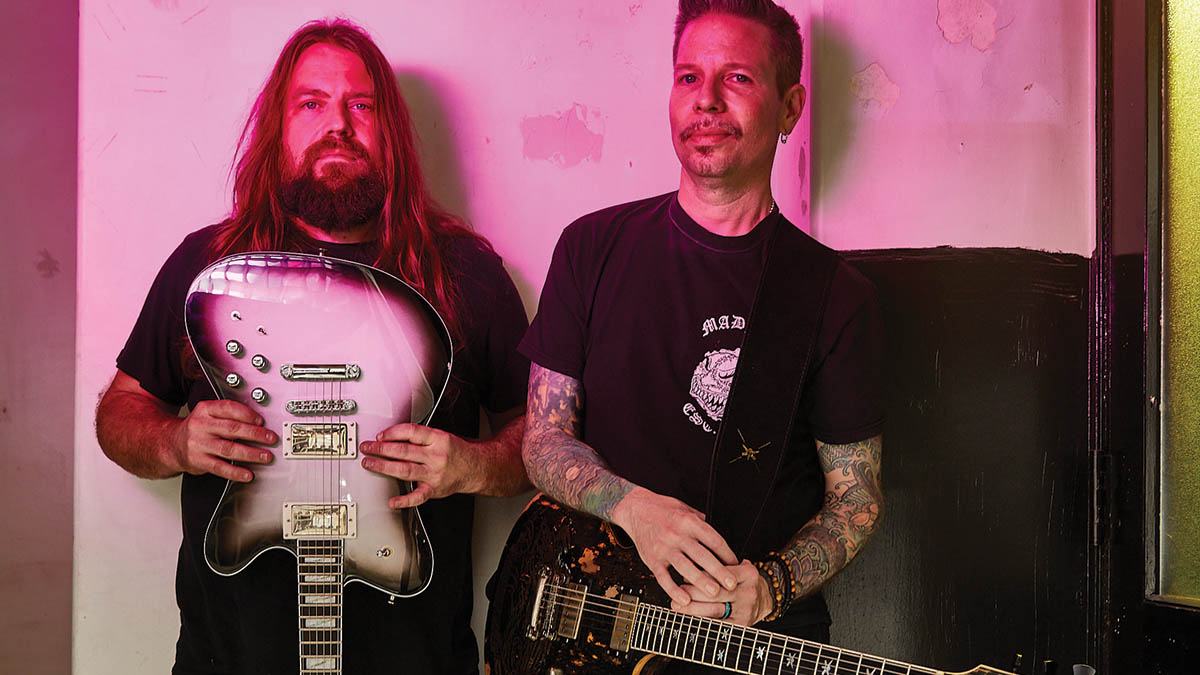
From their Nascent days in the early aughts to the present day, Lamb of God have been a consistently breathtaking live band.
In addition to featuring one of the most volatile, energetic frontmen, Randy Blythe, the quintet is exceptionally tight, and their post-thrash songs are technical, yet accessible, propelled by the complementary, but stylistically different, tones and playing styles of guitarists Mark Morton and Willie Adler.
Having toured steadily since 1994, they finessed their chemistry on the road, retaining their following and gaining new acolytes on package tours and at countless headline shows.
Realizing their strong stage presence was a major selling point, Lamb of God released three live DVDs, Terror and Hubris in 2004, Killadelphia in 2005 and the double-disc set Walk with Me in Hell in 2008.
In 2020, the band performed two livestreams, one for their 2004 album Ashes of the Wake and the other for the 2020 self-titled record they had been touring for when the world went into lockdown. The live songs from the latter were included on an expanded CD/DVD edition of Lamb of God, which came out in March 2021.
“We love playing shows, and we know how good and tight we can be and how connected we can feel performing together,” Morton says from his home in Richmond, Virginia. “Over the years we’ve developed the confidence to win over crowds, even when they’re not all there just to see you. And that’s a powerful thing – having people sharing that experience with you.”
In an effort to capitalize on their strength as a live band and put a new spin on their sound, Lamb of God recorded much of their ninth original studio album, Omens, live in the studio with producer Josh Wilbur.
Get The Pick Newsletter
All the latest guitar news, interviews, lessons, reviews, deals and more, direct to your inbox!
More than a go-to engineer, Wilbur has been like a sixth band member, collaborating with Lamb of God since their sophomore release, 2003’s As the Palaces Burn, and producing their last four albums. The band began their first of two pre-production sessions at a rented house in Virginia Beach in February 2021, less than a year after the release of their self-titled album. While Morton and other band members were excited to have something productive to do during lockdown, Adler wasn’t so thrilled about returning to writing mode.
“I was reluctant to get together to work because we had released the self-titled [album] in June, which I thought was great,” Adler says. “It was almost like we had suddenly broken up with that record. I was like, ‘What the fuck, dude? Can’t we let this record breathe for a fucking second before we move on?’”
Bitter and disgruntled, Adler reluctantly hopped into his car and headed to Virginia Beach to start working on new songs. It wasn’t that he lacked material. Adler and Morton are perpetual noodlers and both had stockpiled riffs since they were forced to stop touring. Adler was afraid Lamb of God would inadvertently wind up creating Lamb of God II.
“I was fucking cussing during the whole drive,” Adler says. “I was like, ‘Fuck these motherfuckers. Why are we doing this? It’s so dumb.’ But then we got there and Mark won me over with his enthusiasm. He said, ‘Hey dude, this is gonna be fun. Let’s do this. We’ll do it totally different from last time.’ And I was like, ‘Okay, I guess I’m just being infantile.”
We were like, ‘Oh, this is cool! It’s super-old-school Lamb of God. Now, where can we go from here?'
Willie Adler
Omens, the culmination of Lamb of God’s hard work, is both a blast from the past and a glimpse of the future. The riffs are urgent and sometimes jarring, the rhythms alternately tumultuous and percussive.
Dissonance is countered with striking melodic songcraft, and blackened rage is juxtaposed with glimmers of hope, expressed most strikingly through the acoustic arpeggios of September Song and the textural delay and reverb-laden atmospherics of Gomorrah.
“Gomorrah was actually one of the first songs we did that really started to breathe and opened up the writing session,” Adler says. “Mark had the melody line that starts the song, and we came up with the chug pattern that goes underneath. Randy was there at the time we did it, and he fell in love with it and came up with this whole part he did overtop of it.
“So suddenly, everyone is really stoked on this song that came from Frankensteining all these parts together. It definitely was a throwback to The Subtle Arts of Murder and Persuasion [from 2000’s New American Gospel]. So we were like, ‘Oh, this is cool! It’s super-old-school Lamb of God. Now, where can we go from here?’”
The answer was deceptively simple – they could go wherever the collaborative process led them. Deciding on a destination, a direction and vibe for the album was far more complex.
There was no set deadline to finish Omens, and with more time to work on an album than ever before, Lamb of God went down the rabbit hole, experimenting with form and function, tapping into a wealth of options before deciding which approach worked best for each song.
“Josh and I joked that this album was The Wrangler,” Morton says. “We were wrestling with these tunes from beginning to end, trying all kinds of different things and tinkering on every idea. From the first pre-production sessions to the vocals to the mix, everything from start to finish was very laborious.
“At times it was incredibly frustrating, and then there were little victories all along the way. Now that it’s done, I look back and I feel comforted ’cause it means we put a lot of ourselves into it, which we typically do. But with this one, we really gave it everything we had.”
With this one, we really gave it everything we had
Mark Morton
Having had a bit of hindsight and time to recover from the PTSD and recall the creative evolution of one of Lamb of God’s darkest and most inventive releases, Morton and Adler discuss what gives Lamb of God their bite, their approach to writing and playing, the advantages and drawbacks of recording almost live in the studio and the unanticipated surprises of The Wrangler.
Willie, can you elaborate on your reservations to leave home and start working on Omens?
Willie Adler: “We started writing so close on the heels of us putting out the self-titled. So I was butt-hurt by the idea of moving on. I thought that record was great and encompassed everything we did well. That we had to put it out in 2020 was a fucking kick in the balls and I was so bummed out. Also, I was freaking out ’cause I was thinking that anything we wrote would be regarded as too close and too similar to what we did on the self-titled. But it’s really not. The stuff is vastly different.”
I have music running around in my head all the time, and I’m thrilled at the chance to get to write more songs with these guys
Mark Morton
Do you think you were being cynical or curmudgeonly at the get-go?
Adler: “It just felt to me like it was too soon. I was writing this new stuff just a few months after we were writing the self-titled record. So it’s not that far of a stretch to think that anything else I wrote would be in that same vein.
“When we started, there were a handful of riffs that were reminiscent of New Colossal Hate or other things from the last record. But we just scrapped those and moved on with the intention of making songs different from anything we had done, while still having our stamp. Once we started doing that I felt better.”
Mark, you didn’t share Willie’s concerns about starting a new record without having properly toured for the self-titled release.
Mark Morton: “I don’t want to contradict Willie, but I didn’t feel like we even toured for that album. So, to me, the album was released and then we were off the road for a year and a half. If you start playing shows a year and a half after a record is released, I don’t feel you’re touring that album anyway.
“Also, I don’t tie touring to recorded work. Those are two completely different spheres of activity for me. I understand some people see it a different way, and I think Willie and Randy do as well.
“But when I’m writing and recording in the studio, I’m part of making a piece of music that people are gonna listen to, and that’s gonna stand alone and be its own thing for as long as they care to listen to it. And it doesn’t have anything to do with how many shows we play after it comes out. So I didn’t feel ripped off at all.”
Were you at all worried that anything you wrote might sound too similar to what you did on the self-titled album?
Morton: “Not at all. I have music running around in my head all the time, and I’m thrilled at the chance to get to write more songs with these guys and record in a new way and in a new place, and try new ideas. It’s my favorite part of what we do.”
Willie, at what point did you decide you were onboard and that doing a new Lamb of God album didn’t necessitate repeating yourself?
Adler: “As soon as we started working, I saw Mark was right and I came to realize there was no reason not to work on the next record. It’s not like the fucking pandemic was going away anytime soon at that point. It wasn’t like we were gonna be able to support the self-titled record anymore. So when we got together in February 2021, Mark and I decided to gravitate more toward downtuning.
“The majority of this record is in C and Grayscale is in B. Then there are a couple of songs in D and one in E. We’ve done songs in C before, so it didn’t feel awkward, but it was different than doing most of your songs in drop D.”
What were the first songs you wrote together for Omens?
Morton: “Things came together in chunks and then Willie and I worked to change parts around and turn these different sections into songs. There were large chunks of Nevermore and Ditch in the first batch of stuff I brought in, and we were able to work on those right away.
Nevermore was the first track you premiered prior to releasing the album.
Morton: “We wanted something that was a little different for us. There’s half a verse, then a return to the riff, and another half verse. Those musical twists are very deliberate. We wanted to give the song a different kind of swagger than our typical 12/8.”
Vanishing that might be one of the first songs we’ve done that hasn’t been picked apart by everyone. I need a trophy for that one!
Willie, what did you bring to the table for the first round of songwriting?
Adler: “It’s funny. I brought in demos of Vanishing and September Song and they couldn’t have been more different. We did Vanishing in its entirety musically, exactly how it is on the demo. We didn’t touch it at all. It just lived. I think that might be one of the first songs we’ve done that hasn’t been picked apart by everyone. I need a trophy for that one!”
What about September Song, an epic album-closer with delicate arpeggios, EBow and strings?
Adler: “The demo for that one was vastly different from what the final song is like. We really didn’t know what to do with it when I brought it in. The whole acoustic intro was some last-minute shit. And we did that all during one of the last pre-production sessions.”
Morton: “The biggest thing about September Song was that it got slowed down dramatically. It didn’t start out as this epic, expansive thing. It was very uptempo – probably 215 bpm – and then we cut the tempo in half and did this clean, ambient-sounding intro, and it turned into this totally different thing.”
Why didn’t you keep it fast and furious like so many of your best songs?
Morton: “Sometimes songs are cool with that energy and that speed. But it just felt… fine. It felt okay. And we wanted to try every angle we could think of to make it more than fine or okay and to see if there’s something we’re missing and if we’re not doing it justice.
“In this case, we weren’t allowing it to be where it felt best. Josh suggested slowing it down and it turned into this plodding, driving thing. We saw how massive and moving and almost anthemic that chord progression felt and we started filling the song out from there. I always feel like the last song on the album is a very coveted position so I thought we should make that different and special.
“But it was Willie’s song. He was the creative director for it even though I added a lot of parts. So I started lobbying him pretty hard. “Yo, this has got to be an album closer, and that’s dope!” And he was cool with making all the changes and turning it into this epic track.”
One of the heaviest songs on the album is Grayscale, which features minor-key harmony guitar lines reminiscent of Slayer.
Adler: “In the back of my mind, those little fucking notes in the verse were absolutely Slayer. I wrote Grayscale not even necessarily for this record. I wrote it out of pure emotion back when we were in quarantine and everything seemed fucked. I went, ‘Let me write the heaviest fucking thing I can make right now.’
“I sent it to Josh for shits and giggles and he went, ‘Holy shit, dude! Why haven’t you brought this to the table for the album?’ I kinda laughed. I went, ‘Why? Is it cool?’ And he said, ‘It’s really fucking cool!’ And I went, ‘Alright. Well, yeah, sure. Let’s do it.’ And we totally turned it into Lamb of God.”
We tracked it as a band, and that’s the first time we’ve done that since As the Palaces Burn or New American Gospel. It was real old-school rock ’n’ roll, man
Once the songs were written and finessed, was it easy to record the main tracks live in the studio?
Adler: “Nothing was easy, but a lot of it was fun. We tracked it as a band, and that’s the first time we’ve done that since As the Palaces Burn or New American Gospel. It was real old-school rock ’n’ roll, man. Just the whole band in there, getting mic’d up. We each had headphones and just played together kinda like we do onstage.
“It had its downsides because there was a lot of sitting around afterwards and getting stuff fine-tuned. And obviously, there was tracking going on outside of those live takes. But we were able to capture a lot of moments and a lot of energy that we felt were missing from a lot of the more recent Lamb of God records.”
Morton: “The real pinnacle of that for me was when we all set up at Henson Studios [in Los Angeles] in the big live tracking room and we all played at once. It was electrifying. Every drum track was recorded with the entire band playing and Randy singing. Substantially more than half of the main vocals you hear on the album were from those room takes.
“And large chunks of the guitars were used as well. So there is a very hands-on, genuine, authentic live element to this album. And I think it’s pretty uncommon for bands these days to work that way.”
Did playing at the same time allow you to capture the differences between your live electric guitar sounds more accurately than on past records?
Adler: “Mark and I definitely have our own tones live, and those are what we used. I definitely prefer scooping mids and Mark is super-nasally on his mids. It works and that’s part of the magic of our live sound. We’ve always tried to capture that in the studio, and I think this time we really did it along with capturing the energy of all of us playing together.”
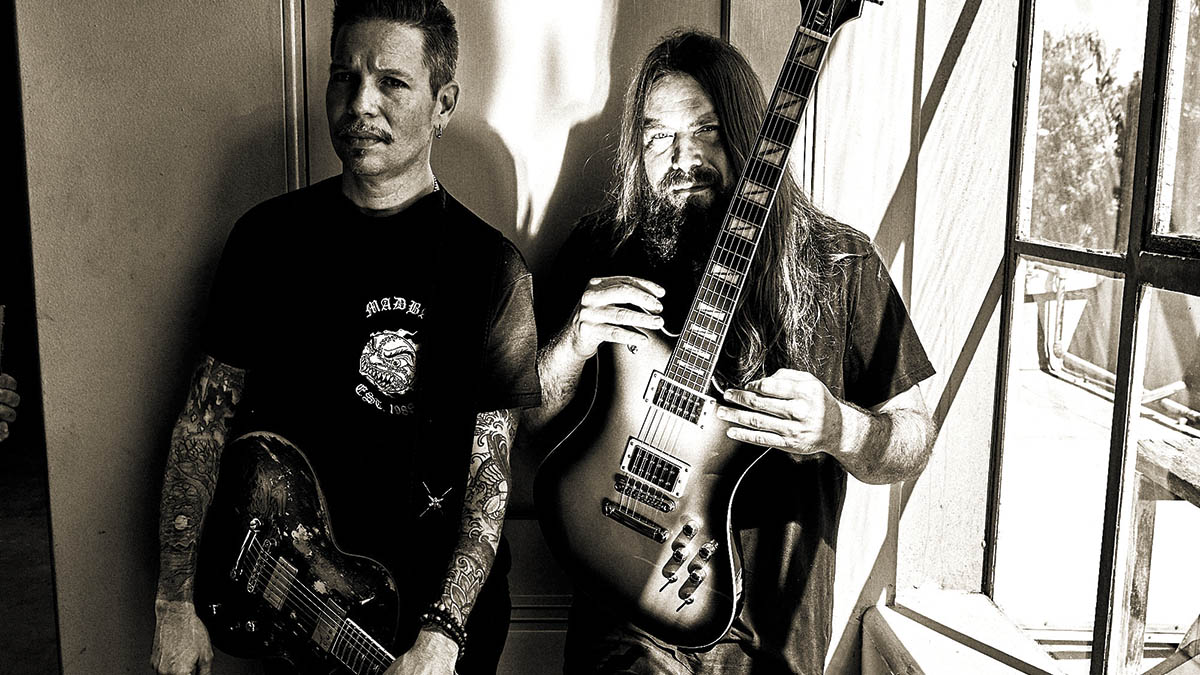
Can you describe what’s so special about the way the two of you write and play together?
Morton: “I think what it comes down to is this juxtaposition. You take my more conventional rock ’n’ roll-influenced playing, but with a heavy hand and a heavy groove.
“When you combine that with Willie’s very out-of-the-box, unconventional note choices and timing, and his unreal technicality, that’s what makes the music really powerful. Swirling those two things up is what makes Lamb of God sound like Lamb of God.”
Randy has called Omens a dark, angry record. Do you think it’s a reflection of the last two years of chaos, death and destruction across the world, from the U.S. to Ukraine?
Morton: “First and foremost, we’re an aggressive metal band. If you’re a filmmaker who makes horror movies, you intend for them to be scary. We intend for things to sound heavy and dark, so that comes with the territory. But it’s been a crazy few years and it’s impossible to be alive and not feel that shift in energy and not be confused and scared by it and not be angered by a lot of it.
“So, as artists who make dark, heavy creations, that’s a wellspring of energy to draw from. But it doesn’t mean we were angry and dark all the time. It’s interesting that the inner-workings, the personal relationships and the vibe in the band are more positive these days than ever.”
If you had any concrete goals going into Omens, do you think you met them?
Morton: “Ultimately, my biggest goal with this one was to make sure it has its own personality and exists uniquely as its own entity. And I think we accomplished that.”
How would you describe the personality of the record in terms of character traits?
Morton: “This album is pretty combative. I find it to be pretty confrontational, but it’s got depth. It’s got a stylistic diversity within the confines of being a metal record, and I think it’s really genuine and inspired. I hear a lot of ourselves in it.
“We were all very, very invested in this record on a very personal level so it sounds very alive and angry. But more than just being angry, I feel like it’s a problem child. That’s what I told Josh. It’s a very independent, disrespectful problem child. We had to fight it all the way to the end, but we had a deep love and respect for the personality it exhibited.”
- Omens is out now via Epic.
Jon is an author, journalist, and podcaster who recently wrote and hosted the first 12-episode season of the acclaimed Backstaged: The Devil in Metal, an exclusive from Diversion Podcasts/iHeart. He is also the primary author of the popular Louder Than Hell: The Definitive Oral History of Metal and the sole author of Raising Hell: Backstage Tales From the Lives of Metal Legends. In addition, he co-wrote I'm the Man: The Story of That Guy From Anthrax (with Scott Ian), Ministry: The Lost Gospels According to Al Jourgensen (with Al Jourgensen), and My Riot: Agnostic Front, Grit, Guts & Glory (with Roger Miret). Wiederhorn has worked on staff as an associate editor for Rolling Stone, Executive Editor of Guitar Magazine, and senior writer for MTV News. His work has also appeared in Spin, Entertainment Weekly, Yahoo.com, Revolver, Inked, Loudwire.com and other publications and websites.
“That required some right hand training. It was like a tongue twister for my hands”: Mike Dawes has transformed a Sleep Token song into a solo acoustic guitar masterclass – and the results are awe-inspiring
“Alternative metal reimagined for solo acoustic? The results are quite mesmerizing”: April 2025 Guitar World Editors' Picks
